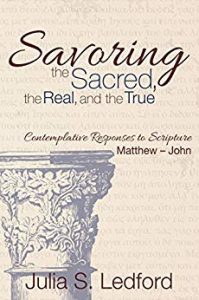Frequently Asked Questions
First, let me offer that the question could be re-phrased as, “How are spiritual formation and spiritual transformation related?” In other words, it is not about difference. It is about correlation.
Second, the definition I would offer is that spiritual formation is the process by which we choose to shape our everyday life in ways that open us to the transforming work of the Spirit of God in our soul. Another way I express it is:
Spiritual formation is the process of being transformed by God’s Love through the Spirit of Christ Jesus.
The goal of spiritual formation is the fulfillment of the promise of the Gospel that we may be “conformed to the Image of Christ.” (Romans 8:29) Followers of Christ are on a journey to be transformed and re-shaped by God’s Love into the persons He created us to be.
For further reading, see the article Spiritual Formation Fundamentals.
No—in a Christian context, it is a response to the call of God for the ongoing transformation in Christ promised in the Gospel. Like many religious practices, there may be correlations with what other religious or spiritual groups choose to practice; but it is not the practice itself that is Christian or not. It is the purpose and focus that makes it Christian. In a Christian context, the focus is on growing in union with Christ through the transformative work of the Holy Spirit in our soul.
This question is embedded in the history of dichotomy between Protestant theology and traditions—and Catholic theology and traditions. But, the history of spiritual formation began when God formed us in His Image and was fully expressed when He sent His Son for our salvation, to re-form us.
In other words, spiritual formation preceded Catholicism. However, it is the monastic tradition in Catholic history that developed and preserved the ancient faith practices associated with spiritual formation as we know it today—passing them on to the larger world.
What I would say is that it is appropriate to be grateful for the rich heritage of biblically-focused spiritual formation, available to both Protestants and Catholics.
Oh, I love this question! Well, I love the answers! The Bible has everything to say about it. The path of spiritual formation can be traced throughout the pages and ages of the biblical witness. It is what God has been about all along!
It is the process of being formed in Christ. Throughout the New Testament, there are passages that portray the Christian life as a process of transformation, such as 2 Corinthians 5:17: “Therefore, if anyone is in Christ, he is a new creation; the old has gone, the new has come.”
Spiritual formation is like a metamorphosis, as with a caterpillar entering into a cocoon and emerging as a butterfly. We enter into the “cocoon” of God’s Love and Grace, allowing His Spirit to re-shape and transform us, so that we begin to live more in His Image. It is the submission of the created soul to the Creator, like clay in a potter’s hand.
Here are some related verses to enjoy:
Galatians 4:19
Romans 12:1-2
2 Corinthians 3:18
Jeremiah 18:1-6
The Latin term Lectio Divina means “sacred reading.” It is a way of reading scripture that takes us beyond intellectual interest, academic study, devotional comfort—into deeper communion with God.
It follows four movements of Grace, named in Latin terms as Lectio, Meditatio, Contemplatio and Oratio. As the terms suggest, after each of four readings of the same passage, you meditate on the overall meaning, contemplate the words that seem to address you personally and respond in prayer about the impact of that truth.
As we read slowly and repetitively through the pages of the Bible, it is like going on a walk with the Spirit as our guide.
The Psalmist said: “Thy Word is a lamp to my feet and a light to my path” (Psalm 119:105). That gives us a picture of someone on a journey, following a path through a dark place, needing a light along the way. By immersing ourselves in God’s Word in the ancient four-fold pattern described above, we open ourselves to more light for our life journey. So, a spiritual practice like Lectio Divina enables us to enter scripture as a place to meet God, walk with Him daily and be more fully transformed.
Lectio Divina is a gateway spiritual practice. When coupled with other disciplines such as Centering Prayer and Discernment, it is a powerful source of spiritual renewal. Many spiritual practices have been passed on to us from ancient times because they have been found to be effective in aiding us in our walk with Christ who has called us to be shaped and formed by His Love into servants of the Living God.
Good question. They do have some characteristics in common and often are utilized hand in hand. However, Centering Prayer as a Christian spiritual discipline is a specific way of meditating that is unique to the Christian formation tradition.
For many Christians, meditation is akin to prayerfully pondering things in our hearts. In meditation in a general world view, the focus is to clear the mind and thereby allow the soul and body to be freed from the thoughts and memories that bind one with unhealthy bondage, as in Yoga. That is a healthy practice, but Centering Prayer is specifically focused on communion with God through silence.
It has best been described by Thomas Keating in his book, Open Mind, Open Heart.[1] In a nutshell, it is a prayer of silence in which you allow no thought to come between you and God. You begin with a worshipful gaze toward God in your soul, calling Him by your heart’s name for Him. You sit in silence for about 20 minutes, sending all other thoughts down the river of His love, entrusting all concerns to Him. More and more, your mind clears and you simply are present with God, allowing His Love to be all you need.
[1] Keating, Thomas. Open Mind, Open Heart. New York, NY: The Continuum Publishing Company, 1998.
These practices are called disciplines due to the root meaning of the word. In our times, “discipline” has a connotation of judgment and punishment—which has nothing to do with its use as a term in spiritual formation.
From ancient times, Christian spiritual practices were called disciplines because they help us train and teach our souls to live our lives within the context of God’s Love revealed in Christ and in dependence on the guidance of His Spirit. The root word is the same as for the term “disciple.” So, spiritual disciplines enable us to better follow Christ as disciples.
I recommend Lectio Divina and Centering Prayer as basic formational disciplines. The next two that I would recommend incorporating into your daily life would be Discernment and the Examen.
The scriptures, from Old Testament to New, call us to seek wisdom. The writer of Proverbs said: “Get wisdom, get understanding; do not forget my words or swerve from them. Do not forsake wisdom, and she will protect you; love her, and she will watch over you. Wisdom is supreme; therefore, get wisdom. Though it cost all you have, get understanding” (Proverbs 4: 5-7).
Spiritual Discernment is a process for discovering the wisdom of God through paying attention to the longings of your heart. God is in our longings when those longings are without selfish or wicked intent. The movement of the Spirit can be discerned in the effects on our lives through the experiences of our days.
In spiritual discernment, we learn to pay attention to God, and a Spiritual Director has experience in assisting in the process. There are tried and true stages of listening, watching and waiting for God that enable us to move from disorientation to re-orientation, desolation to consolation, to use some terms you will often hear in spiritual formation.
While God is always drawing us to truth, whether we call upon a Spiritual Director to assist or not, a trained Spiritual Director can serve as a “midwife” as the Spirit brings to birth what God is bringing to life in you.
An essential step in the process is to reach a stage of “holy indifference’ to anything other than God’s will. While that may seem like a tall order, it is simply living into Christ’s call to “deny yourself, take up your cross and follow me” (Matthew 16:24).
Examen is also a Latin term and refers, as it sounds, to examination. However, it is not an examination for purposes of judgment. It is often called an Examination of Conscience, but that is indicative of judgment. I have also heard it called Examen of Conscious, which is closer to its purpose.
The best name is “Examen of Consciousness.” What it really does for us is to provide a way to remind us to daily walk with God and be more conscious of His longings for our lives. It is not about blaming ourselves for our sins and failures, though honest confession is necessary; but it is primarily about entrusting ourselves to the loving work of God in our lives.
It is really quite simple. At the end of each day, we take a few moments to reflect on the day in communion with the Spirit. You may journal as you do so, which is in itself a spiritual discipline of recording your walk with the Lord.
As we reflect on the day, we pay attention to the times when we were Christ-focused and when we were aware of God’s Love at work in our lives or through others, and in the created order of the universe and world. And, we notice when we were not. We confess that and receive God’s renewing forgiveness through Grace.
The purpose is to make us more attentive throughout our days to the presence and love of God in our soul and in our actions or that of others. There are many different forms that the Examen can take, but the simplest is to ask yourself two questions:
- When did I think of God today?
- When did I forget or dismiss Him?
Asking these two questions every evening will have a profound impact on your life over time. By becoming more aware of God at work in your life and surrendering more and more to His will, you will be gradually transformed into the person He is calling you to be.
I am happy to say that it is! In fact, there are examples in the earliest writings of scripture. Look at the life of Daniel in the Old Testament. His life could only be lived by the dictates of the conquerors of Israel. He was a captive, used in the courts of the King and expected to give allegiance to whatever the King decreed. In spite of that, Daniel made time every day to pray three times, even after an edict was specifically devised against it and led to his being thrown into the lions’ den (from which God miraculously protected him). Read about it in Daniel 6.
Another illustration is in the New Testament. Jesus saw Nathanael meditating under a fig tree and commended him for it. In those days, a man had much hard physical work to do in order to survive, but Nathanael found time for communion and meditation with God.
Of course, Jesus modeled for us the value of living our lives with rhythm and balance. He shaped his days and evenings into a flexible pattern that allowed time for God and time for ministry.
From the early days of Christendom, devout followers of Christ have done the same. It came to be known as a “Rule of Life” in monastic circles, and the spiritual disciplines they used can help us shape a pattern of life that opens us to Christ’s presence and guidance.
Here is a sample schedule for a “Rule of Life” that incorporates Lectio Divina, Centering Prayer, Silence and Solitude, and the Examen. This is a pattern designed to enhance your spiritual formation:
- Begin the day with God through a reading of scripture and grateful thanksgiving. Intercede for family, friends and the needs of the world.
- At mid-day, take at least five minutes to read, “listen” and reflect on that same passage with imagination—noticing the details, characters, action, etc. Be aware of God’s presence.
- In the afternoon, take a few minutes to read the same passage again, noting the words and phrases that seem to address you. Meditate on them.
- Before bedtime, take time to read the passage again, praying about what God seems to be saying to you.
- Examine your day, reflecting on where you noticed God and when you missed Him. Conclude with Centering Prayer as a time for communion in the Spirit.
All total, that will take only one hour or less of your day. Jesus asked his disciples in the Garden of Gethsemane, before his arrest and during his prayer for the world, “Could you not watch with me one hour?” (Matthew 26:40) It seems a small price to pay for receiving the gift of Salvation and the transformation of the Spirit.
A brief word about Sabbath:
Another important discipline is “Sabbath.” God gave the gift of Sabbath to us at Creation and it basically means to rest from your labors. Whenever you have opportunity to take a day or longer for retreat, to dedicate more than a few minutes to spiritual communion with God, you will find that your life with God becomes more and more enriched. But, a daily pattern of spirituality in some form of a Rule of Life is essential for ongoing formation. Those moments you give to God throughout your day are moments of “Sabbath rest.”
Unless otherwise noted, all quotations of scripture are from the New International Version.
THE HOLY BIBLE, NEW INTERNATIONAL VERSION®, NIV®
Copyright © 1973, 1978, 1984, 2011 by Biblica, Inc.®
Used by permission. All rights reserved worldwide.




